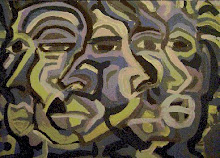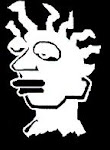 What inspires us?
What inspires us?Or - From where does creativity come?
Earlier cultures have given the rights of creativity to the Muses.
But who are these Muses?
If these Muses are wrong - are they really Demons?
 Artists are known to go through spells of madness.
Artists are known to go through spells of madness.But it is during these spells when they are most creative.
(John Nash and his mental disorders being an example.)
Or;
http://www.cosmosmagazine.com/features/print/2687/do-you-have-be-nuts-be-a-genius
Some creative people need drugs, alcohol or bouts of depression to reach a level of being to be able to communicate with these Muses.
(Although a lack of sleep - or maybe a lack of dreams - also gets one to this point)
 Is creation (or creativity) a natural reaction to an altered state?
Is creation (or creativity) a natural reaction to an altered state?Or a higher level of consciousness (or unconsciousness)?














7 comments:
That's the thing. You need a little madness (or apparent madness) in order to change paradigms, break molds, make new discoveries, create lasting works of beauty and/or thought, or change the world. There is a fine line between Genius and Madness, but I always thought the muses were there to help you watch your step. I could be wrong however, and it was their goal to push you over the edge all along.
bully for you mayne - you cookin with gas now!!!
rotflmbao....,
Sophia develops out of syneidesis (conscience) as the guide from thaumazein (shock, astonishment, amazement (a-maze-ment), wonder) into theoria (meditative contemplation). Theoria has two aspects, enstasis (concentrative focus-samadhi practice in the Hindu/ Buddhist East) and diakrisis (analytic insight meditation -- prajna practice in the Hindu/Buddhist tradition). Theoria is alchemically sublimated thaumazein; it is illumined thaumazein or sublimated thaumazein. Through some repeated exercise or ritual or practice, thaumazein becomes theoria. Such a repeated exercise and/or practice is thaumaturgy (literally, in the Greek, thauma + ergon-wonder + work, translated into Latin as the magnum opus). The guide in such an initiatory process was thaumaturgos.
In ancient times, philosophy was something like the cross between karma and jnana yoga. Pythagoras coined the word philosophy for the status of the transitional individual awakening to the higher. There is a specifc lineage that runs from Pythagoras through Empedocles to Plato that brings out the early yogic nature of philosophy. Kingsley's book on Empedocles and philosophy as a yoga and tied to ancient shamanism is one recent title on this topic. As brought out by Sargeant in his book on the god Dionysos, philosophy and Pythagoreanism have roots in the mysteries of Dionysos also. Thus, another yoga-like way that became something else was theatre.
Originally, theatre (which is related in its Greek root to thaumazein and theoria because originally it was a thaumaturgy that cultivated theoria or seeing) was a initiatory school, at least, until Thespis. A spectacle and speculation were originally something more than their decadent meanings of contemporary times as was theory (which was not a conceptual model or opinion held in the head but a direct seeing-a gnosis).
"Is creation (or creativity) a natural reaction to an altered state? Or a higher level of consciousness (or unconsciousness)?"
I'm going to go with both ;)
@ NoFace - Yeah... I think so too.
Any person who has the delusion of making the world a better place (to make a simple example) HAS to be "crazy" to go against all of the established dogmatics and traditions.
Martin must have been touched,
As well as Malcolm, Mahatma or even Obama.
What knowledge, or faith, or delusion would cause them to think that things could be better when most other people thought that we should settle for what we already had?
@ RunningMom - Yep, me too.
@ SeeNew - Damn... more HOMEWORK?
But I always found the opinion of Sophia interesting in regards to Socrates because he was said to be the wisest because he knew that he knew nothing.
(In Christianity it would be to seek the Kingdom as a child.)
That's why I can't completely discount Christianity - only the way it is practiced by most religions today.
(Thousands of years of wisdoms can't ALL be wrong.)
What was known and done in antiquity was SO MUCH more substantial than the watered down "sickness of faith" that we've been tricked into confusing with Christianity.
These people were practicing a science and all that's been handed down to the masses of today is a superstitious cult.
@ SeeNew - Yep. Because some thought that the power of true knowledge was reserved for the privilaged few.
I'd love to spend a few months in the Vatican library to see what the original copies really said.
Post a Comment